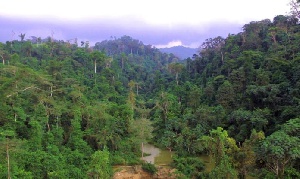 File photo of the Atiwa Forest
File photo of the Atiwa Forest
Small, Medium Forest Enterprises (SMFEs) have been trained and encouraged to undertake proper documentation of their processes and activities in accordance with Regulation 76 of the Timber Resource Management and Legality Licensing Regulation 2017, (LI 2254).
Speaking to the media on the sidelines of a refresher training workshop at Elmina, designed to assist SMFEs to assemble and provide evidences required for monitoring and transparency compliance, the Snr. Projects Officer of the Kumasi Wood Cluster (KWC), Madam Betty Boante Abeyie noted that record keeping is crucial in Ghana’s quest to ensure only legal wood is sold on the domestic and foreign markets.
She stated that, the successful implementation of the Forest Law Enforcement, Governance and Trade (FLEGT) license which facilitates unfettered access to the European Union (EU) market, depends on the careful tracking of wood products to their source as a key demand, coupled with proper documentation of processes along the timber supply chain.
The training workshop was organized by the Kumasi Wood Cluster Association (KWC), in partnership with Nature and Development Foundation (NDF) as part of activities under the UKAID funded “Building capacity of Small and Medium sized Forest Enterprises (SMFEs) to supply and trade in legal timber in Ghana and Liberia” project. The project developed simplified procedures and data capturing templates to meet requirements of the Timber Resource Management and Legality Licensing Regulation, 2017 (LI 2254). The SMFEs were trained to build folders of their own information and documents, and store for submission to the Forestry Commission, auditors and Voluntary Partnership Agreement (VPA) monitors.
In order for SMFE’s to adequately comply with the law, KWC and NDF observed that SMFEs will need continuous training support to compile and keep the required transparency information and other data that demonstrate legality, hence the workshop.
The workshop at Elmina was the third in a refresher training series (after Kumasi and Bibiani) targeting key staff from 120 SMFEs. Participants drawn from SMFEs within the Central, Eastern and Western regions, were taken through Regulation 76 of LI 2254 which stipulates that industry players make available information (documents) on forest resource management during audits and upon request.
In her presentation, Madam Abeyie stated that, keeping proper documentation isn’t a choice but a legal requirement with consequences to their operations. She displayed and explained the specific documents needed at the various critical points such as sourcing of the timber, harvesting, log transportation, processing, lumber transportation and at the point of sale, whether for domestic or foreign market.
Besides the presentations, participants undertook series of exercises including role play of audit and identification of sample documents for various critical control points along the timber supply chain which helped to boost their confidence of being able to meet the legality requirements.
As Ghana seeks to get FLEGT License to tap the numerous trade opportunities on the European market, it has become imperative for key players in the sector to be trained and equipped, especially at the lower levels to meet the demands of the licensing regime.
Ghana, just like any other country pursuing the license, is expected to build a strong legality system to prove to potential buyers that its wood is sourced legally for sustainable conservation of the forests. The Ghana Legality Assurance System (GhLAS), therefore, seeks to put in place the measures for that purpose.
Madam Abeyie touched on the need for SMFEs to be proactive in facilitating compliance. “My word to the SMFEs in the forestry sector is that they stand to gain in the business if they keep proper records of their activities and are always ready to present such documents to auditors upon request. In effect, they need not wait until they are asked to; rather they should prove their worth by presenting such documents voluntarily to officials,” she said.